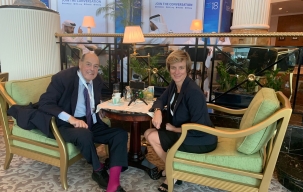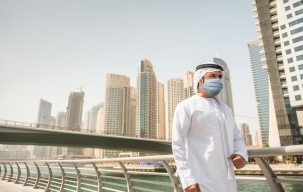Key dates
Latest
-

-

-
 Members content
Members content

Abu Dhabi
10 million, including 8.8 million expats
Federation of absolute monarchies represented by Federal Supreme Council alongside partly appointed-partly elected Federal National Council
UAE President Sheikh Mohamed bin Zayed al-Nahyan, Emir of Abu Dhabi
Prime Minister Sheikh Mohammed bin Rashid Al Maktoum, also UAE Vice-president, Minister of Defence and ruler of Dubai
December 2nd
H.E Mr Mansoor Abulhoul
Embassy of the United Arab Emirates, 1-2 Grosvenor Crescent, London, SW1x 17EE
H.E Mr Edward Hobart CMG
British Embassy Abu Dhabi, Al Hisn Street, Al Markaziyah West, PO Box 248 Abu Dhabi, United Arab Emirates
Population
The majority of the population live in the three largest emirates, Abu Dhabi, Dubai and Sharjah. The current population stands at just under 10 million people, with expats, an estimated 8.8 million, being greatly in the majority. Approximately 85% of inhabitants live in the above three regions.
The ethnic breakdown of the UAE mirrors that of many of the wealthy Gulf states which employ a large degree of migrant labour to help contribute to their booming economies. This translates to just 11.6% of the country being considered Emirati. Almost 60% of the country are from South Asia, 10% from Egypt, 6% from the Philippines, and the remaining 13% from other locations.
Government
The UAE is a federation of monarchies, the capital of which is Abu Dhabi. It is divided into seven administrative divisions. The constitution was introduced in the 1970s and became permanent in May 1996. The legal system is a mixture of Sharia and civil law.
The country’s executive is made up of the president, vice-president and the prime minister and deputy prime minister. There is the Council of Ministers which is appointed by the prime minister and approved by the president.
The process for choosing presidents and vice presidents involves the Federal Supreme Council, which is made up of the rulers of each emirate. Posts last for 5-years and are renewable. The prime minister and deputy are appointed by the president.
The legislative of the UAE is the 40-seat Federal National Council. Half of the members of the council are appointed by the leaders of each emirate. The remaining twenty are appointed by an electoral college whose members are assigned by each emirate’s ruler.
History
The history of the modern state of the UAE can be traced to the so-called "Trucial States" which emerged in the 19th century. The name came from a series of truces that were signed by the ruling sheikhs along the coast of the Gulf. These states, at the end of the 19th century, outsourced the management of their foreign relations to Britain.
7 emirates = 1 country
In 1968, Britain announced the withdrawal of its troops from the Gulf. This started the process by which various states such as Qatar, Bahrain and Oman became independent modern states. The story of the UAE differs slightly in that, as its name suggests, rather than being comprised of one sheikhdom, they were actually a grouping of 6 at first, with Ras Al Khaimah joining a year later in 1972, uniting a total of 7 individual sheikhdoms into one country.
The 7 emirates are Abu Dhabi, Dubai, Sharjah, Ajman, Umm Al Quwain, Fujairah and Ras Al Khaimah.
Federation
In the 1970s was a series of domestic agreements to promote centralisation and the emergence of a type of federal government. There were occasional moments when individual emirates became wary of the rate of centralisation, but compromise, often involving access to centralised government positions, tended to quell such fears. What emerged was a structure by which the UAE’s executive included a greater role for the increasingly affluent rulers of the Dubai emirate. Thus, the country’s executive now comprises leadership figured from the Nahyan (rulers of Abu Dhabi) and the Maktum family (rulers of Dubai).
Economy
The UAE experienced an economic boom towards the end of the 20th century, which was tempered by the 2008 financial crash. At the time, there was a particular concern that Dubai would struggle with the new economic reality, but a loan from Abu Dhabi helped the emirate weather the worst impacts of the crash.
Arab Spring
The next internal difficulty would come in 2011 as the region saw protests of the Arab Spring. The UAE did not see the same scale of protests as other countries in MENA, but there were still criticisms that the tense political atmosphere was used to clamp down on expression. However, a significant programme of investments across the country, particularly concentrated on the realtively poorer northern emirates was also a significant factor that seemed to keep internal tensions reduced.
Since then the UAE has maintained its role as a key centre of business and investment for the region. It continues to play an active role in the geopolitics in the region and remains a close ally of most of its neighbours Gulf Arab neighbours.
Golden Jubilee 2021
The UAE began its celebrations for its Golden Jubilee with a series of spectaculars attended by leaders and crown princes of all 7 emirates in Hatta, Dubai on December 2nd 2021. The country received congratulations from countries all around the world.
Religion
An estimated 76% of people in the UAE are Muslim, Christians include around 9% and other faiths, including Hindu, Sikh, Buddhist and the minority faiths of the Middle East number around 15%. Around four-fifths of Muslims in the country are Sunni, with Shia minorities being located in Dubai and Sharjah.
Culture
Emirati culture is based on Arab-Bedouin culture. As with many of the countries in the Gulf, there are also influences from areas like East Africa. Rapid urbanisation has obviously had a huge impact on the culture, with the vast majority of citizens now living in urban environments, in which many other nationalities also work and live. And yet, the traditional power structures of emirs ruling each emirate remain, as well as the pride many Emiratis have in their Bedouin roots.
While connection to past traditions remain an anchoring point for Emirati culture, there is also in contrast a radical optimism at the heart of much of the country, particularly well embodied in the case of places like Dubai. Comparing pictures of Dubai in the 1970s and 1980s now give an indication of the scale of rapid development that the area went through in a very short space of time. This would have been impossible without vast oil reserves, but, nevertheless, Dubai in particular was a fast learner and a pioneer. This culture of optimistic development has been summed up by many commenators as the leading example globally of the “build it and they will come” philosophy.
Economy
GDP per capita in the UAE stands at around $68,000. The main industries in the UAE include petrol, fishing, cement and some aluminium. Unemployment stands at just 1.6%.
The UAE, while very reliant on its oil industry, has made significant progress in diversifying its economy and now hosts a significant service sector as well with a sizeable private sector. It is one of the most diversified economies in the GCC. Various zero-tax free trade zones in the country have also attracted investment.
The 2008 financial crash impacted the UAE significantly and was particularly challenging for the Dubai governate, which was reliant at the time on stable property prices. Although the situation has since stabilised, memory of the crash and relative instability in the oil prices make further diversification, effective taxation and more jobs for UAE nationals economic priorities for the UAE at the moment.


